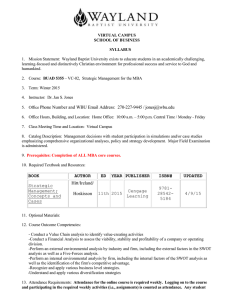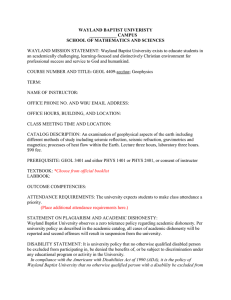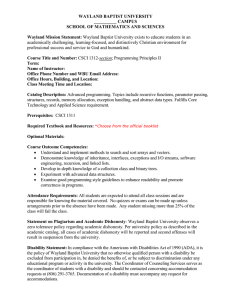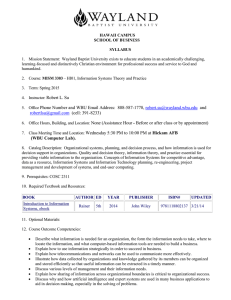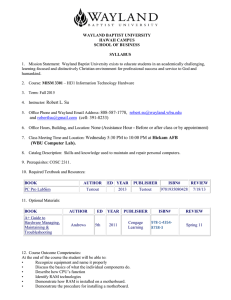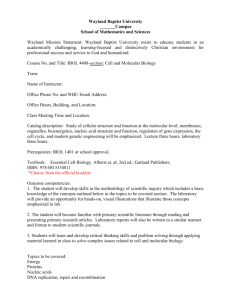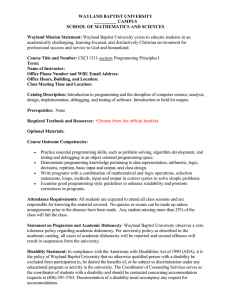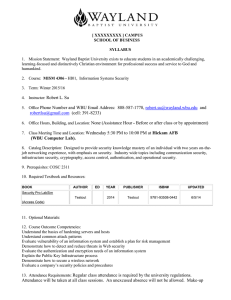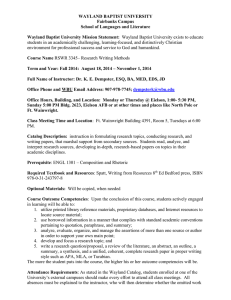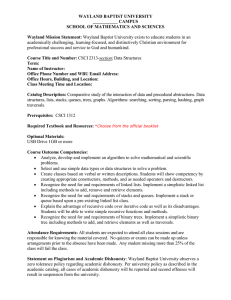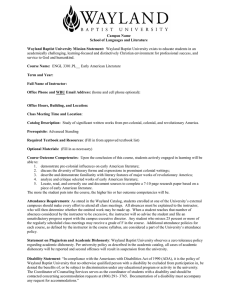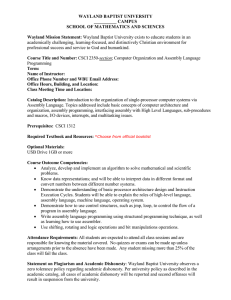Document 10387415
advertisement
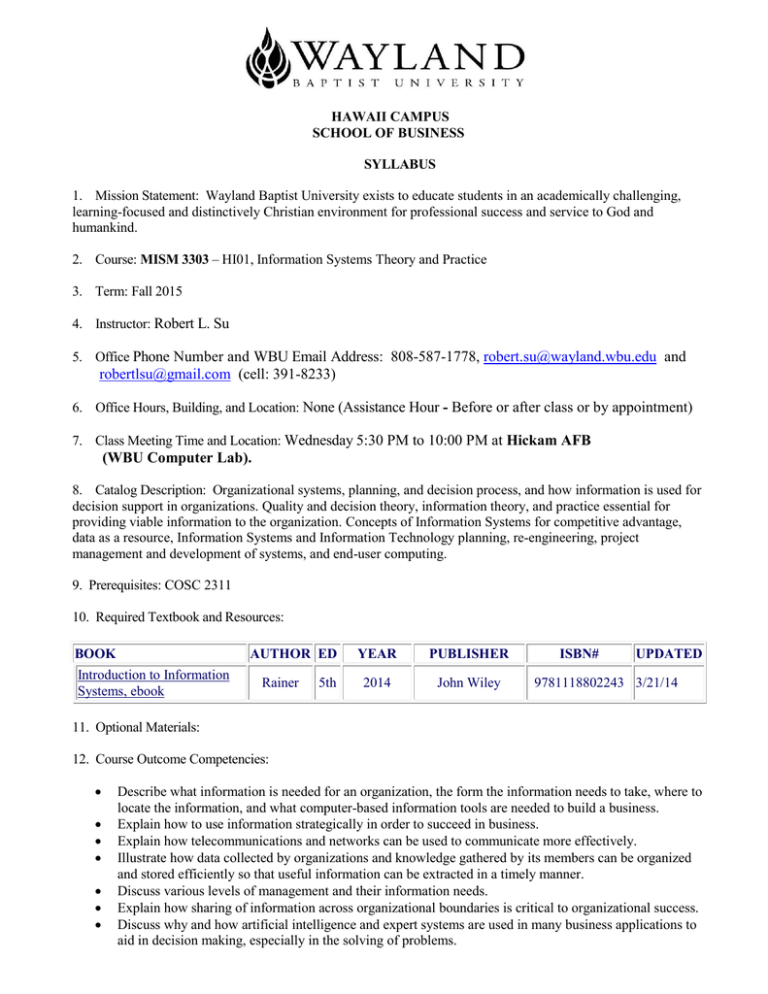
HAWAII CAMPUS SCHOOL OF BUSINESS SYLLABUS 1. Mission Statement: Wayland Baptist University exists to educate students in an academically challenging, learning-focused and distinctively Christian environment for professional success and service to God and humankind. 2. Course: MISM 3303 – HI01, Information Systems Theory and Practice 3. Term: Fall 2015 4. Instructor: Robert L. Su 5. Office Phone Number and WBU Email Address: 808-587-1778, robert.su@wayland.wbu.edu and robertlsu@gmail.com (cell: 391-8233) 6. Office Hours, Building, and Location: None (Assistance Hour - Before or after class or by appointment) 7. Class Meeting Time and Location: Wednesday 5:30 PM to 10:00 PM at Hickam AFB (WBU Computer Lab). 8. Catalog Description: Organizational systems, planning, and decision process, and how information is used for decision support in organizations. Quality and decision theory, information theory, and practice essential for providing viable information to the organization. Concepts of Information Systems for competitive advantage, data as a resource, Information Systems and Information Technology planning, re-engineering, project management and development of systems, and end-user computing. 9. Prerequisites: COSC 2311 10. Required Textbook and Resources: BOOK AUTHOR ED Introduction to Information Systems, ebook Rainer 5th YEAR PUBLISHER 2014 John Wiley ISBN# UPDATED 9781118802243 3/21/14 11. Optional Materials: 12. Course Outcome Competencies: Describe what information is needed for an organization, the form the information needs to take, where to locate the information, and what computer-based information tools are needed to build a business. Explain how to use information strategically in order to succeed in business. Explain how telecommunications and networks can be used to communicate more effectively. Illustrate how data collected by organizations and knowledge gathered by its members can be organized and stored efficiently so that useful information can be extracted in a timely manner. Discuss various levels of management and their information needs. Explain how sharing of information across organizational boundaries is critical to organizational success. Discuss why and how artificial intelligence and expert systems are used in many business applications to aid in decision making, especially in the solving of problems. Show ways organizations develop new information systems. Explain why the integrity of the data and the reliability of their information systems are so critical to an organization’s success. Identify appropriate responses to managerial and organizational issues stemming from development, implementation, and use of computer-based information systems. Discuss challenges in implementation of international information systems, including economic and cultural differences. Summarize major ethical and societal issues involved in development and use of information technology. 13. Attendance Requirements: Regular class attendance is required by the university regulations. Attendance will be taken at all class sessions. An unexcused absence will not be allowed. Make-up tests will be considered, with prior arrangements, only for serious reasons. Be sure to inform the instructor when you foresee that you must miss a class or test, because of serious reasons. Absences: All Wayland students are expected to attend every class meeting; the minimum percentage of class participation required to avoid receiving a grade of “F” in the class is 75%. Students who miss the first two class meetings without providing a written explanation to the instructor will be automatically dropped from the roster as a “no-show.” Students who know in advance that they will be absent the first two class meetings and who wish to remain in the class must inform the instructor in order to discuss possible arrangements for making up absences. 14. Statement on Plagiarism and Academic Dishonesty: Wayland Baptist University observes a zero tolerance policy regarding academic dishonesty. Per university policy as described in the academic catalog, all cases of academic dishonesty will be reported and second offenses will result in suspension from the university. 15. Disability Statement: “In compliance with the Americans with Disabilities Act of 1990 (ADA), it is the policy of Wayland Baptist University that no otherwise qualified person with a disability be excluded from participation in, be denied the benefits of, or be subject to discrimination under any educational program or activity in the university. The Coordinator of Counseling Services serves as the coordinator of students with a disability and should be contacted concerning accommodation requests at (806) 291- 3765. Documentation of a disability must accompany any request for accommodations.” 16. Course Requirements and Grading Criteria: Submit One’s Own Work. Each student is expected to complete his or her own assignments. Copying others’ work is not allowed. There will be a penalty of copying in tests and project assignments. Tests - There are two tests (Midterm Exam and Final Exam) scheduled for the term. Test dates are indicated in the Course Schedule. Grading - The grade will be based on the following elements of your course responsibilities: Midterm: 20% Project and assignment: 40% Class Participation: 10% Final Exam: 30% The following guidelines will be used in determining the final grades. A: >= 90, B: 80 – 89, C: 70 – 79, D: 60 – 69, F: <60 Grading Criteria Statement: Students shall have protection through orderly procedures against prejudices or capricious academic evaluation. A student who believes that he or she has not been held to realistic academic standards, just evaluation procedures, or appropriate grading, may appeal the final grade given in the course by using the student grade appeal process described in the Academic Catalog. Appeals may not be made for advanced placement examinations or course bypass examinations. Appeals are limited to the final course grade, which may be upheld, raised, or lowered at any stage of the appeal process. Any recommendation to lower a course grade must be submitted through the Executive Vice President/Provost to the Faculty Assembly Grade Appeals Committee for review and approval. The Faculty Assembly Grade Appeals Committee may instruct that the course grade be upheld, raised, or lowered to a more proper evaluation. 17. Tentative Schedule: Fall 2015 (08/17/2015 – 10/31/2015) 08/19/15 --- Ch 1 Introduction to Information Systems 08/26/15 --- Ch2 Organization Strategy, Competitive Advantage, and IS 09/02/15 --- Ch 3 Ethics and Privacy Ch4 Information Security 09/09/15 --- Ch 5 Data and Knowledge Management (Black Board) 09/16/15 --- Midterm 09/23/15 --- Ch 6 Telecommunications and Networking/ (Black Board) 09/30/15 --- Ch 7 E-Business and E-Commerce Ch 8 Wireless Mobile Computing, and Mobile Commerce 10/07/15 --- Ch 9 Social Computing 10/14//15 --- Ch 10 Information Systems Within the Organization 10/21/15 --- Final Exam Note: Subject to change if necessary
